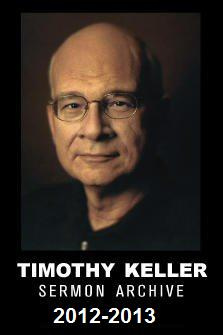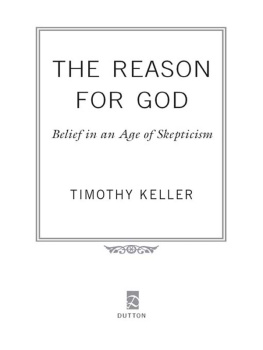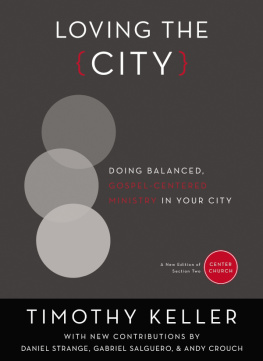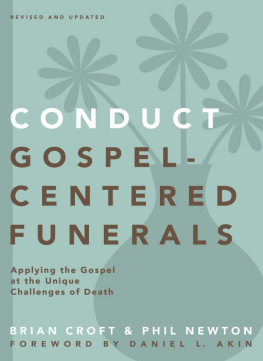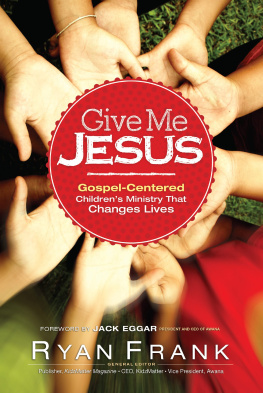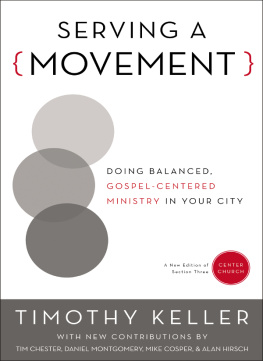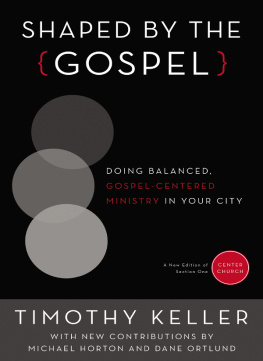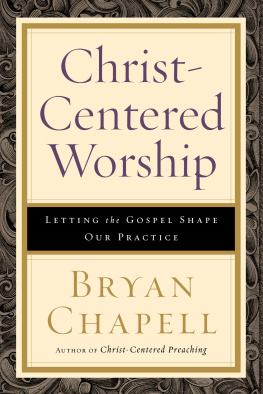Gospel Renewal
Center Church,
Part 2
TIMOTHY KELLER

To Terry Gyger,
founder of the Redeemer Church Planting Center,
missions pioneer, colleague, and friend.
And to the staff,
church planters,
and network leaders
of Redeemer City to City,
for living out this vision
in the global cities of the world.
BIBLE BOOKS
| Gen | Genesis |
| Exod | Exodus |
| Lev | Leviticus |
| Num | Numbers |
| Deut | Deuteronomy |
| Josh | Joshua |
| Judg | Judges |
| Ruth | Ruth |
| 12 Sam | 12 Samuel |
| 12 Kgs | 12 Kings |
| 12 Chr | 12 Chronicles |
| Ezra | Ezra |
| Neh | Nehemiah |
| Esth | Esther |
| Job | Job |
| Ps/Pss | Psalm/Psalms |
| Prov | Proverbs |
| Eccl | Ecclesiastes |
| Song | Song of Songs |
| Isa | Isaiah |
| Jer | Jeremiah |
| Lam | Lamentations |
| Ezek | Ezekiel |
| Dan | Daniel |
| Hos | Hosea |
| Joel | Joel |
| Amos | Amos |
| Obad | Obadiah |
| Jonah | Jonah |
| Mic | Micah |
| Nah | Nahum |
| Hab | Habakkuk |
| Zeph | Zephaniah |
| Hag | Haggai |
| Zech | Zechariah |
| Mal | Malachi |
| Matt | Matthew |
| Mark | Mark |
| Luke | Luke |
| John | John |
| Acts | Acts |
| Rom | Romans |
| 12 Cor | 12 Corinthians |
| Gal | Galatians |
| Eph | Ephesians |
| Phil | Philippians |
| Col | Colossians |
| 12 Thess | 12 Thessalonians |
| 12 Tim | 12 Timothy |
| Titus | Titus |
| Phlm | Philemon |
| Heb | Hebrews |
| Jas | James |
| 12 Pet | 12 Peter |
| 123 John | 123 John |
| Jude | Jude |
| Rev | Revelation |
BIBLE VERSIONS
| ESV | English Standard Version |
| KJV | King James Version |
| NASB | New American Standard Bible |
| NIV | New International Version |
| NJB | New Jerusalem Bible |
GENERAL
| AD | anno Domini (in the year of [our] Lord) |
| cf. | confer, compare |
| ch(s). | chapter(s) |
| diss. | dissertation |
| ed(s). | editor(s), edited by, edition |
| e.g. | exempli gratia, for example |
| esp. | especially |
| et al. | et alii, and others |
| ff. | and the following ones |
| ibid. | ibidem, in the same place |
| idem | that which was mentioned before, same, as in same author |
| i.e. | id est, that is |
| n. | Note |
| NT | New Testament |
| OT | Old Testament |
| p(p). | page(s) |
| repr. | reprinted |
| rev. | revised |
| trans. | translator, translated by |
| v(v). | verse(s) |
Introduction
CENTER CHURCH THEOLOGICAL VISION
SUCCESSFUL, FAITHFUL, OR FRUITFUL?
Once we embark on a life of ministry, it is only natural to ask, How am I doing? And how will I know? One answer for ministers today is success. Many say that if your church is growing in conversions, members, and giving, your ministry is effective. This view of the ministry is on the rise because the expressive individualism of modern culture has deeply eroded loyalty to institutions and communities. Individuals are now spiritual consumers who will go to a church only if (and as long as) its worship and public speaking are immediately riveting and attractive. Therefore, ministers who can create powerful religious experiences and draw large numbers of people on the power of their personal appeal are rewarded with large, growing churches. That is one way to evaluate a ministry.
In reaction to this emphasis on quantifiable success, many have countered that the only true criterion for ministers is faithfulness. All that matters in this view is that a minister be sound in doctrine, godly in character, and faithful in preaching and in pastoring people. But the faithful not successful backlash is an oversimplification that has dangers as well. The demand that ministers be not just sincere and faithful but also competent is not a modern innovation. The famous nineteenth-century English Baptist preacher Charles Spurgeon pointed out that it takes more than faithfulness to make a minister:
Certain good men appeal to me who are distinguished by enormous [passion] and zeal, and a conspicuous absence of brains; brethren who would talk forever and ever upon nothing who would stamp and thump the Bible, and get nothing out of it at all; earnest, awfully earnest, mountains in labor of the most painful kind; but nothing comes of it all therefore I have usually declined their applications.
Notice that Spurgeon has obvious affection for these men. He is not ridiculing them. He says they are faithful and deeply committed to the work of the ministry, but nothing comes of it all. When they teach, there is little or no learning; when they evangelize, there is little or no converting. And so he declines their application to his college for ministers. In short, it is an oversimplification to say that faithfulness is all that matters. No something more than faithfulness is needed to assess whether we are being the ministers we should be.
As I read, reflected, and taught, I came to the conclusion that a more biblical theme for ministerial evaluation than either success or faithfulness is fruitfulness. Jesus, of course, told his disciples that they were to bear much fruit (John 15:8). Paul spoke even more specifically. He spoke of conversions as fruit when he desired to preach in Rome: that I might have some fruit among you also, even as among other Gentiles (Rom 1:13 KJV). Paul also spoke of the fruit of godly character that a minister can see growing in Christians under his care. This included the fruit of the Spirit (Gal 5:22). Good deeds, such as mercy to the poor, are called fruit as well (Rom 15:28).
Paul spoke of the pastoral nurture of congregations as a form of gardening. He told the Corinthian Christians they were Gods field in which some ministers planted, some watered, and some reaped (1 Cor 3:9). The gardening metaphor shows that both success and faithfulness by themselves are insufficient criteria for evaluating ministry. Gardeners must be faithful in their work, but they must also be skillful, or the garden will fail. Yet in the end, the




